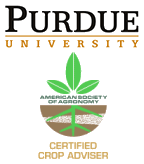
Proceedings 2007
Indiana Certified Crop Adviser Conference
Nutrient Management for Selected Cucurbits
To properly manage nutrient inputs for cucurbits one must first know their nutrient requirements. This presentation will focus on melons and pumpkin, with some additional information about cucumbers and hard squash. With the exception of cucumber the other four crops will accumulate in the vegetation and fruit 145 to 160 lbs N (nitrogen), 30 to 45 lbs P2O5 (phosphate) and 160 to 180 lbs K2O (potassium) per acre. Cucumber tends to accumulate about half those amounts. Cucurbits, as a group, can develop good root systems that go down to three feet or more and that are able to effectively utilize nutrients and water available in the soil. The soil environment must be favorable for the roots to develop to their full potential. Proper management of the physical properties of the soil is very important for good root growth and nutrient uptake. Soils that have been well conditioned through good crop rotation and incorporation of organic matter in the form of cover crops, compost or manure provide this favorable environment.
Darryl D. WarnckeProfessor and Extension Specialist of Soil Fertility and Plant Nutrition
Michigan State University.
warncke@msu.edu
Darryl Warncke grew up on a general crop and livestock farm in northwest Ohio. He received his B.S. degree in soil science from Ohio State University and his advanced degrees in soil fertility from Purdue University. Dr. Warncke is professor and extension specialist of soil fertility and plant nutrition in the Department of Crop and Soil Sciences at Michigan State University. He specializes in: 1) soil fertility and nutrient management for field and vegetable crops; 2) management of organic soils; and 3) testing methodology for the analysis of soils and other growth media. He has been the research coordinator for the Michigan State University Muck Research Farm since 1976 and has served as Supervisor of the MSU Soil Testing and Plant Analysis Lab since 1974. Darryl also serves as the MSU faculty liaison to the Michigan Onion Committee. His research has focused on efficient utilization of the essential plant nutrients, N, P, K, Ca, B and Mn, based on soil and plant analysis. He is widely recognized for his expertise regarding the soil fertility and plant nutritional requirements of vegetable crops grown on both organic and mineral soils. Over the years he has worked closely with Michigan Extension Educators and vegetable growers on evaluating the nutrient requirements of a wide array of vegetable crops.
Dr. Warncke was instrumental in the development of the Saturated Media Extract method used by most commercial labs for analysis of artificial greenhouse growth media. This method has also found utility in assessing the quality of other materials, especially composts. He is an active participant of the North Central Soil and Plant Analysis Committee and has served on the Oversight Committee for the North American Proficiency Testing Program.
He has been recognized by his Extension peers and colleagues by receiving the Outstanding Extension Specialist Award from both the MSU Extension Specialist Association and from the Michigan Association of Extension Agents (MAEA). He has also received the Master Farmer Associate Award from the Michigan Vegetable Council in recognition of outstanding service to the Michigan vegetable industry.